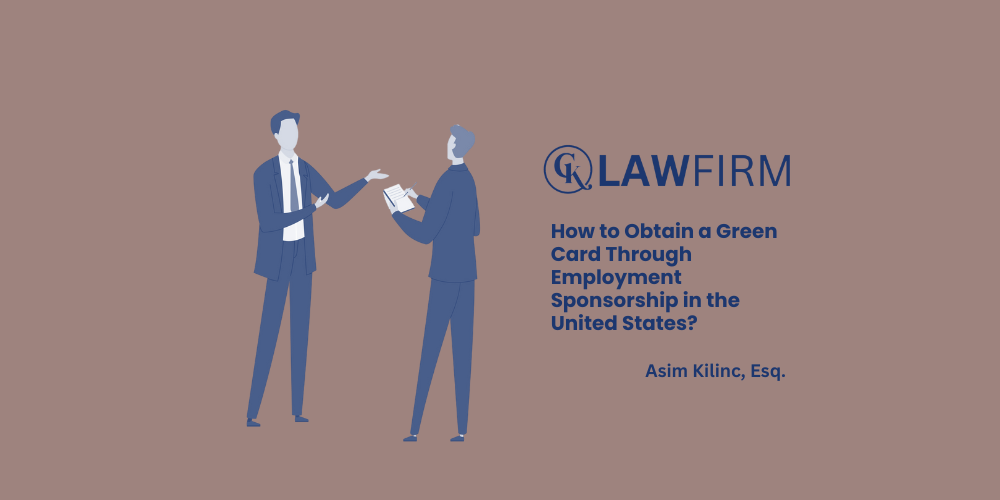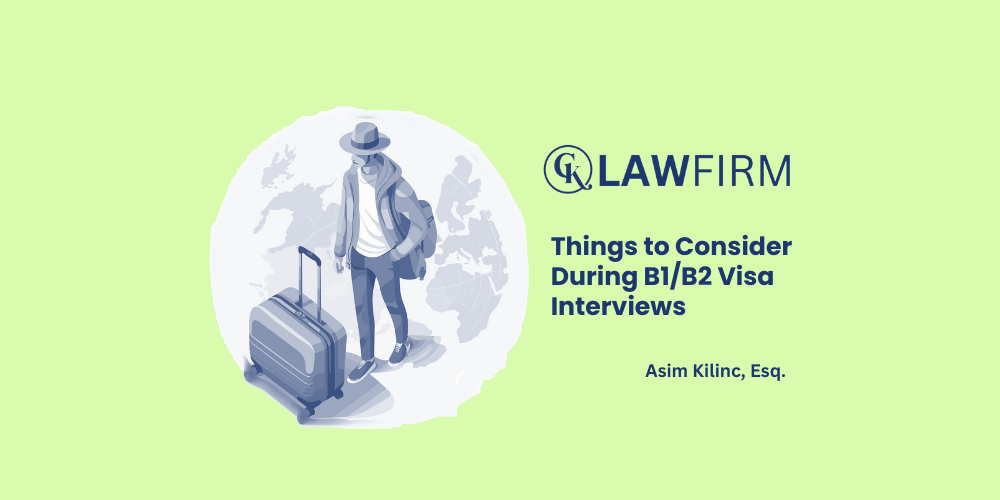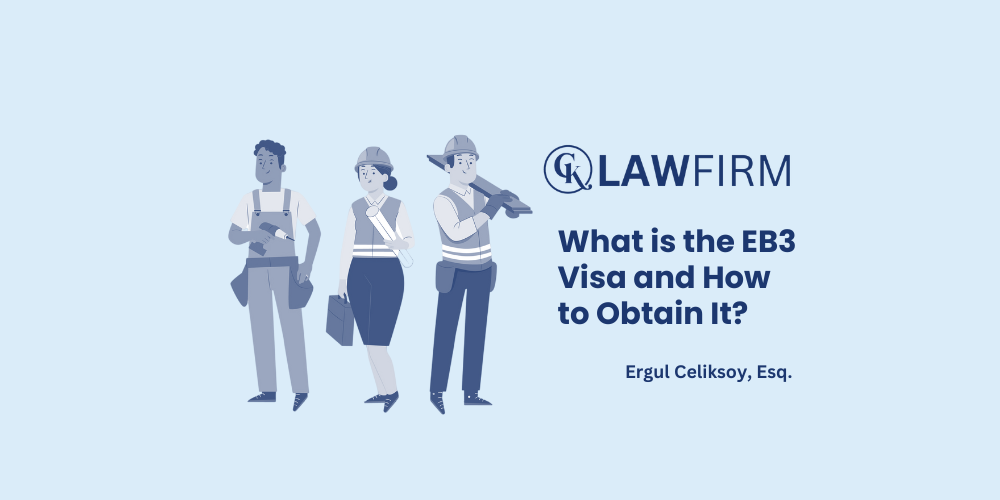Schedule an Appointment with Our Attorneys Now
By Ergul Celiksoy, Immigration Attorney at CK Law Firm
If you want to start your own business and live in the United States, the E2 investor visa could be an ideal option for you. The E2 visa allows citizens of countries that have a trade agreement with the U.S. to establish and operate a business by making a substantial capital investment. There are many different sectors and business opportunities available for investors who wish to move to the U.S. through the E2 visa. In this article, we will provide information on E2 visa business ideas, investment amounts, and the application process to help you successfully start a business in the United States.
Below are the key topics we will cover:
- What is an E2 Visa?
- Business Ideas You Can Start in the U.S. with an E2 Visa
- Advantages of Starting a Business in the U.S. with an E2 Visa
If you have any further questions or want to explore more, feel free to visit our website. For personalized inquiries, you’re always welcome to connect with me on LinkedIn. Enjoy reading!
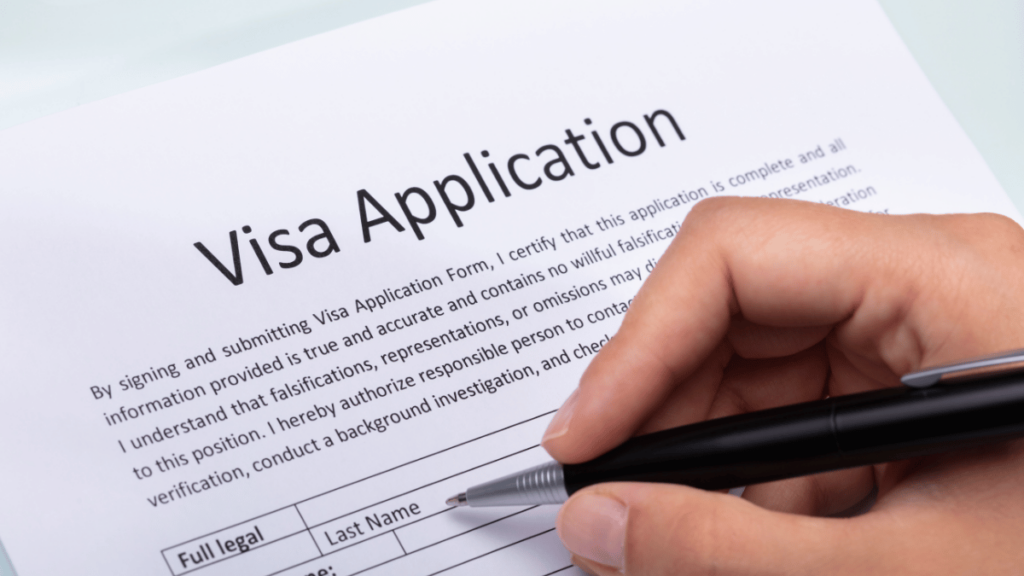
What is an E2 Visa?
The E2 investor visa allows investors to live and manage a business in the United States by making a significant capital investment in a U.S.-based company. However, this visa does not directly provide a green card; as long as the investor continues to operate their business, the visa can be renewed.
There is no fixed fee for the E2 visa, but the application process may involve legal fees and other costs. The typical investment amount for an E2 visa ranges between $100,000 and $200,000, although in some cases, lower investments may also be accepted.
Business Ideas You Can Start in the U.S. with an E2 Visa
There are various business opportunities available for those considering establishing a business in the U.S. through the E2 visa. Here are some promising E2 visa business ideas for 2025:
1. Franchise Businesses
Purchasing a franchise is one of the safest options for the E2 visa. Well-known franchises such as Subway, and 7-Eleven are attractive for investors. Franchise systems typically provide a proven business model, reducing the risk of failure for investors.
2. E-Commerce and Online Stores
E-commerce businesses, such as Amazon FBA, Shopify stores, or private-label products, are gaining popularity due to their low startup costs. Focusing on a niche product can be a profitable way to enter the U.S. market.
3. Restaurant and Café Businesses
The food and beverage sector is always in demand in the U.S. Organic food restaurants, vegan cafés, or restaurants specializing in Turkish cuisine are particularly popular. With a successful restaurant concept, you can reach a large customer base in major cities.
4. Automotive Sector: Car Rental or Car Wash Businesses
Car ownership is widespread in the U.S., making car rental or car detailing services profitable business ideas. In particular, electric vehicle charging stations or mobile car wash services are expected to have significant potential in 2025.
5. Digital Marketing Agency
Many small businesses in the U.S. need support with social media management and digital marketing. You can establish an agency specializing in SEO, social media advertising, or content marketing to offer services to these businesses.
6. Beauty and Personal Care Services
Hair salons, spas, and skincare clinics hold a significant market share in the U.S. Opening a beauty center that offers the latest trends and technologies can be particularly successful in large metropolitan areas.
7. Education and Consulting Services
Offering English language instruction to non-native speakers, career counseling, or software training can provide high-profit margins with low startup costs.

Advantages of Starting a Business in the U.S. with an E2 Visa
- Pathway to a Green Card: Although the E2 visa does not directly provide a green card, successfully operating and expanding a business can facilitate the transition to other investment visas like the EB-5.
- Work Authorization for Family Members: The spouses of E2 visa holders can obtain work authorization, and their children can access the U.S. education system.
- Unlimited Visa Renewals: As long as the business remains active, the E2 visa can be renewed indefinitely.
There are numerous business opportunities available for those considering starting a business in the U.S. with an E2 visa. Profitable E2 visa business ideas include franchise operations, e-commerce, restaurants, the automotive sector, and digital marketing agencies. If you aim to establish a successful business in the U.S. through the E2 investor visa, preparing a solid business plan and securing the necessary capital will be key steps for a successful application.
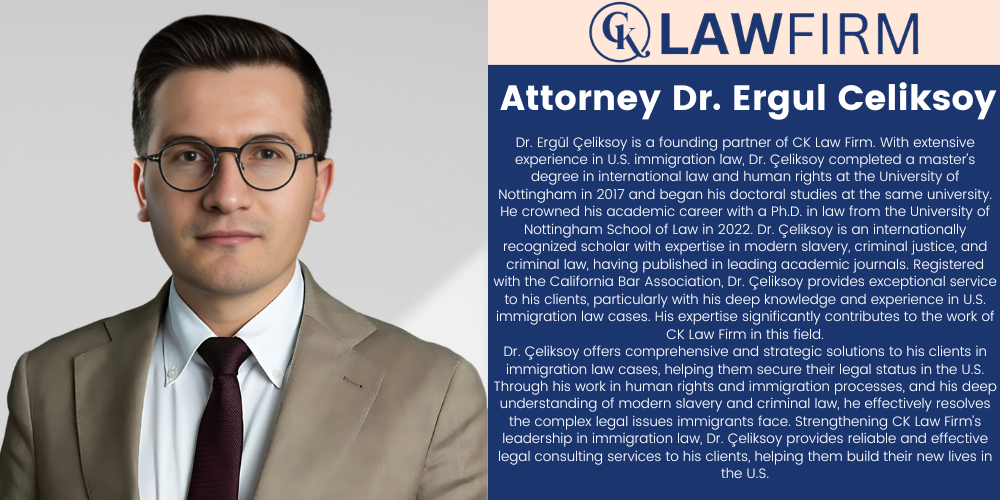
By Asim Kilinc, Immigration Attorney at CK Law Firm
Obtaining a Green Card, which grants permanent residency and work rights in the United States, is a significant opportunity for many immigrants. While there are various paths to obtaining this card, employment sponsorship is one of the most common and reliable methods. Securing a Green Card through employment sponsorship follows a specific procedure, and there are many critical points to consider throughout this process. In this article, we will thoroughly examine all the stages of obtaining a Green Card through employment sponsorship and the keys to success in this process:
- What is Employment Sponsorship and Green Card?
- The Basic Steps to Obtaining a Green Card Through Employment Sponsorship
- Important Considerations in Employment Sponsorship
If you have any additional questions, please do not hesitate to reach out to me directly through LinkedIn, via the comment section below this article, or through our CK Law Firm Immigration Law Firm’s website!
What is Employment Sponsorship and Green Card?
What is Employment Sponsorship?
Employment sponsorship is when an American employer supports a foreign employee’s application for a Green Card. The employer must apply to the U.S. Department of Labor, proving that the position cannot be filled by a resident citizen in the U.S. This sponsorship is typically carried out under work visas such as EB-2 and EB-3.
What is a Green Card?
A Green Card is a document that grants the holder permanent residency and work rights in the United States. Green Card holders can live, work, and study anywhere in the U.S. Additionally, after fulfilling certain requirements, Green Card holders may apply for U.S. citizenship.
For more detailed information about Green Cards, you can check out this article!
The Basic Steps to Obtaining a Green Card Through Employment Sponsorship
PERM (Program Electronic Review Management) Process:
This process involves the employer applying for a labor certification from the U.S. Department of Labor. To obtain this certification, the employer must demonstrate that a specific position cannot be filled by American workers. This includes steps such as posting job advertisements and conducting interviews with potential candidates. The employer must prove that no suitable American citizen was found for the job.
I-140 Immigrant Petition:
After completing the PERM process, the employer submits an I-140 Immigrant Petition to USCIS. This petition indicates that the employer intends to hire the foreign employee permanently and that the employee possesses the necessary qualifications. Once the I-140 petition is approved, the employee can proceed with the Green Card application.
c. Green Card Application:
After the I-140 petition is approved, the employee can apply for a Green Card in two ways:
- I-485 Adjustment of Status Application: If the employee is already in the U.S., they can apply to adjust their status to a Green Card using Form I-485.
- Consular Processing: If the employee is abroad, they can start the Green Card process by applying at their local U.S. consulate.
Important Considerations in Employment Sponsorship
Employer’s Reliability and Financial Status
USCIS considers the financial stability and sustainability of the employer. The employer must have the financial strength to ensure the long-term employment of the employee. Financial documents, tax returns, and business plans are crucial in this process.
Employee’s Qualifications and Experience
The employee’s qualifications play a significant role in the employment sponsorship process. The employer must prove that the employee possesses all the qualifications required for the position. These qualifications include education, professional experience, and special skills. Especially for the EB-2 visa, the employee must have advanced education or exceptional ability in their field.
For more detailed information on the EB-2 visa, you can check out our blog!
Successful Completion of the PERM Process
The PERM process is one of the most critical steps in obtaining a Green Card through employment sponsorship. The employer must post job advertisements on appropriate platforms and complete the application process meticulously. The accuracy of all information provided during the application and the completeness of the documents are of great importance.
Length of the Green Card Application Process and Time Management
The Green Card application process can be lengthy and complex. Time management and careful monitoring of application steps are essential during this process. The employee and employer must take each step of the application process on time to avoid rejection. Especially tasks like collecting documents, filling out forms, and paying application fees must be completed promptly.
For applications made from abroad, the interview conducted at the local U.S. consulate is of great importance. During the interview, the candidate must clearly express their intent to live and work permanently in the U.S. Consular officers will review all the candidate’s documents, and if any incorrect or missing information is found, the application may be denied.
Conclusion
Obtaining a Green Card through employment sponsorship in the U.S. is a lengthy process that requires meticulous attention. An application supported by accurate information and documents increases the chances of a successful outcome. Factors such as the employer’s financial status, the employee’s qualifications, the successful completion of the PERM process, and time management are the cornerstones of this process. Since the process of obtaining a Green Card through employment sponsorship is complex and lengthy, the guidance of an experienced immigration attorney is invaluable at every step. Due to the complexity of the process and legal requirements, it may be beneficial to seek assistance from an immigration attorney. Please remember that you can reach me directly through LinkedIn, via email at info@cklawfirm.org, or through our CK Law Firm Immigration Law Firm’s website!
Who is Lawyer Asım Kılınç?
Lawyer Asım Kılınç, as a founding partner of CK Law Firm, stands out with his mastery of both international law and the American legal system, gained through years of experience. Completing his Master’s degree at Southern Methodist University Dedman School of Law, Kılınç is registered with the Missouri Bar and specializes in U.S. immigration law. His deep knowledge and experience in immigration law have significantly contributed to CK Law Firm’s successes in this field. Having participated in the preparation processes of over 1,000 cases in immigration law, Lawyer Kılınç has proven his expertise in this field, providing comprehensive and professional legal support to his clients, facilitating their adaptation to their new lives in the U.S.
Strengthening CK Law Firm’s leadership in immigration law, Lawyer Kılınç offers reliable and effective legal consultancy services to his clients, standing by them in their journey to establish a new life in the U.S. He works to ensure that his clients receive the highest quality service in citizenship, Green Card, work permit, and other immigration processes, providing support to his clients throughout the entire process, from the beginning to U.S. citizenship.
By Asim Kilinc, Immigration Attorney at CK Law Firm
The B1/B2 visa is one of the most common types of visas applied for by those wishing to travel to the United States for business or tourism purposes. The visa interview is one of the most critical stages that will determine whether your application is accepted. In this article, we will touch on the important points to be aware of during the B1/B2visa interview:
- Be Prepared with the Correct Documents
- Honesty and Consistency
- Present Evidence Supporting Your Return
- Choose Appropriate Attire for the Interview
- Clearly State the Purpose of Your Visa
- Financial Adequacy
- Prepare in Advance
- Documents Supporting Your Travel Plans
If you have any further questions regarding the B1/B2 visa type, please don’t hesitate to contact me via the comments section at the bottom of this article, by sending a direct message on LinkedIn, or through the website of CK Law Firm, where I am a co-founder.
Be Prepared with the Correct Documents
It is crucial to present complete and accurate documents during the B1/B2 visa interview. Consular officers may request the following documents from you:
- Passport: A passport valid for at least six months from the date of travel.
- DS-160 Form Confirmation Page: The completed and approved online application form.
- Visa Appointment Confirmation Document: The document showing your interview appointment.
- Financial Documents: Bank statements, pay stubs, letters from your employer.
- Previous Visas and Passports: If applicable, old passports and previous visas.
Honesty and Consistency
Being honest and providing consistent information during the interview is extremely important. If the consular officer detects any inconsistencies in the information you provide, your application may be denied. You should give clear and direct answers to the questions and avoid making any false statements.
Present Evidence Supporting Your Return
You need to prove during the interview that you only intend to go to the United States for a temporary period. To prove your intention to return to your country, you can:
- Employment Status: A letter of leave from your current employer or projects that require your return.
- Financial Situation: Documents showing your financial status in Turkey, your properties, and investment accounts.
- Family Ties: Documents showing your ties with your spouse, children, or other close relatives.
Choose Appropriate Attire for the Interview
Wearing formal and simple attire shows the seriousness of the interview. You should dress carefully to leave a positive first impression on the consular officer. Without going overboard, make sure to appear clean and well-groomed.
Clearly State the Purpose of Your Visa
The consular officer will want to know why you want to go to the United States. Clearly explain the purpose of your trip. Are you going for a business trip? What events will you attend? If you are going for tourism, specify the places you plan to visit and how long you intend to stay.
Financial Adequacy
You will need to show how you will cover your expenses during your stay in the United States. Bank statements or sponsorship documents play an important role in this phase. Proving that you have sufficient financial resources will contribute to a positive outcome for your visa application.
Prepare in Advance
Preparing for possible questions in advance will increase your confidence during the interview. Study the frequently asked questions and practice your answers. Be ready for questions such as “How long do you plan to stay in the United States?” or “Have you ever applied for a visa before?”
For more information about U.S. visa interviews, you can check out this article!
Documents Supporting Your Travel Plans
Providing documents that support your travel purpose and duration can be helpful during the interview. Airline ticket reservations, hotel reservations, or documents related to the events you will attend should confirm your travel plans.
Conclusion
The B1/B2 visa interview is one of the most important steps in obtaining a visa. Careful preparation and an honest approach will help you have a successful interview. By following this guide, you can increase your chances of getting a positive result on your visa application. Additionally, don’t forget that you can reach me directly through the CK Law Firm Immigration Law Firm website, via email at info@cklawfirm.org, or on LinkedIn!
Attorney Asim Kilinc
Attorney Asım Kılınç, a founding partner of CK Law Firm, stands out with his extensive experience and expertise in both international law and the American legal system. Kılınç completed his Master’s degree at Southern Methodist University Dedman School of Law and is registered with the Missouri Bar. He specializes in U.S. immigration law, significantly contributing to CK Law Firm’s success in this field with his deep knowledge and experience. Having been involved in the preparation processes of over 1,000 immigration cases, Attorney Kılınç has proven his expertise and provides comprehensive and professional legal support to help his clients adapt to their new lives in the USA.
Strengthening CK Law Firm’s leadership in immigration law, Attorney Kılınç offers reliable and effective legal consultancy services to his clients, accompanying them on their journey to establish a new life in the USA. He works to ensure that his clients receive the highest quality service in citizenship, Green Card, work permits, and other immigration processes, supporting them from the beginning to U.S. citizenship.
By Ergul Celiksoy, Immigration Attorney at CK Law Firm
In this week’s article, I focus on the EB-1A Extraordinary Ability Visa, also known as the EB-1A Green Card. I will address the most frequently asked questions about the EB-1A visa, based on the dozens of EB-1A Green Card cases I have prepared and the hundreds of clients I have consulted. By reading this article, you will find answers to the following questions:
- What is the EB-1A Extraordinary Ability Visa?
- What are the advantages of applying for the EB-1A Extraordinary Ability Visa?
- Who can apply for the EB-1A Extraordinary Ability Visa?
- What are the requirements to apply for the EB-1A Extraordinary Ability Visa?
- Where should you file your EB-1A Extraordinary Ability Visa?
- How long does it take to process an EB-1A Extraordinary Ability Visa if you opt for Premium Processing?
- What is the application process for the EB-1A Extraordinary Ability Visa?
- What should you expect after your EB-1A Extraordinary Ability Visa is approved by USCIS?
If you have any additional questions about the EB-1A visa, please do not hesitate to reach out to me via the comments section below, by sending me a direct message on LinkedIn, or by contacting me through the contact section on the CK Law Firm Immigration Attorney Firm’s website.
What is the EB-1A Extraordinary Ability Visa?
The EB-1A visa is a U.S. immigrant visa granted to individuals with extraordinary abilities in fields such as science, arts, athletics, education, and business. This means that if you possess extraordinary abilities in any of these fields, you can obtain a U.S. residency and work permit (Green Card) and subsequently pave the way for U.S. citizenship for yourself and your immediate family members.
Many of my clients initially find the term “extraordinary ability” intimidating and attribute great significance to this term. However, during the initial evaluation meetings, we often discover that the clients meet the criteria set by USCIS for this visa type.
To clarify the term “extraordinary ability,” let’s discuss what it truly means.
Extraordinary Ability: Do You Need to be Superman?
The short answer is “no.” USCIS does not expect you to be Superman or possess supernatural powers to apply for this visa. What USCIS means by “extraordinary ability” is that you should stand out from a substantial number of your colleagues due to your achievements and successes in your field.
Meeting 3 out of 10 Criteria
Individuals in fields like science, arts, athletics, and business must either have received national/international awards (such as Nobel, Emmy, Olympic gold medal) or meet at least three of the ten criteria listed on the USCIS website. Many clients focus on the initial part of the sentence mentioning prestigious awards and think they are not eligible for this visa. However, the USCIS has clear criteria, and you are expected to meet at least three of them. Thus, when evaluating your suitability for EB1-A visa, focus on whether you meet three out of the ten criteria listed on the USCIS website.
What are the Advantages of Applying for the EB-1A Extraordinary Ability Visa?
The EB-1A Extraordinary Ability Visa grants you and your immediate family (spouse and children under 21) the right to live and work in the United States (Green Card). After obtaining your Green Card, you can apply for U.S. citizenship after five years. Additionally, the number of applications for the EB-1A visa is significantly lower than for other immigrant visas, meaning the waiting time is considerably shorter, allowing you to potentially obtain a Green Card in a considerably short period of time.
Who Can Apply for the EB-1A Extraordinary Ability Visa?
Individuals with extraordinary abilities in science, arts, athletics, education, and business who can demonstrate that they will continue their success in the U.S. with supporting documents can apply for the EB-1A visa.
In all U.S. immigration processes, including the EB-1A Extraordinary Ability Visa, the burden of proof is on the applicant. This means that the USCIS officers evaluating your case will make a decision on the documents and petitions you and your attorney file.
What are the Requirements to Apply for the EB-1A Extraordinary Ability Visa?
To qualify for the EB-1A Extraordinary Ability Visa, you must meet at least three out of the ten criteria listed on the USCIS website and provide documentation to support your claims. When preparing applications for my clients, I focus on meeting at least 4-5 criteria instead of just three, as I have found this strategy effective in successfully getting the applications approved!
CRITERION 1: Receiving awards in the field:
The applicant must have received awards in their field. These awards must be well-known and highly regarded in the field. Local school certificates or minor regional awards are not considered national or international recognition. You must have received an award with national or international recognition to meet this criterion.
CRITERION 2: Membership in associations or professional organizations due to achievements:
This means being a member of well-known organizations in your sector where membership is significant. Simply paying membership fees to join an association does not meet this criterion. It refers to memberships that are earned through achievements and contributions.
CRITERION 3: Published materials about you or your works in professional or major trade publications:
This criterion requires that your achievements have been covered in the press and media. News articles in small local newspapers or personal blogs do not meet this criterion. You must have been featured in national or international media.
CRITERION 4: Judging the work of others in your field:
This means that you have evaluated the work of others in your field. This criterion is particularly easy for academic applicants to meet. If you have been a reviewer or editor for academic journals in your field, supervised PhD or master’s students, or participated in an academic committee to evaluate others’ work, you can easily fulfil this criterion. For non-academic applicants, serving as a jury member on a review panel in their field can also be used to meet this requirement.
CRITERION 5: Evidence of your contributions to your field:
You must provide evidence proving how you made scientific, academic, artistic, athletic, or industry contributions in your field. Emphasizing all original contributions you have made will strengthen your application. If you have made new discoveries, methods, or techniques in your field, this will be particularly beneficial. To document your contributions, you can include reference letters from other experts in your field as part of your application.
CRITERION 6: Authorship of scholarly articles:
This means having written articles or papers shared in journals or publications related to your field. Articles in local magazines or small-scale internet blogs do not meet this criterion. If you have published articles in reputable journals within your area of expertise, you can use these to fulfill this criterion. Additionally, if you have written articles for leading publications in your field, even if they are not academic journals, these can also be used to meet this requirement.
CRITERION 7: Exhibitions of your work at significant exhibitions or showcases:
Your work must be exhibited at significant industry exhibitions or showcases. Work displayed in local art galleries or school exhibitions is not considered significant. It is important to note that for this criterion, your works must have been included in nationally and internationally recognized and respected exhibitions. For artists in the film industry, participating in national and international film festivals and receiving awards can also be used to fulfil this criterion.
CRITERION 8: Leading or playing a critical role in a distinguished organization:
You must have held a leadership role in a distinguished organization in your field. Leading a small local club is not considered a critical role. As emphasized with previous criteria, simply being a manager or leader in any organization is not sufficient for this criterion. The organization where you have held a leadership role must be recognized, prestigious, and respected in your field.
CRITERION 9: Earning a high salary compared to others in your field:
You must have earned a significant income compared to others in your field. Earning an average salary in a local job does not count. The criterion generally refers to earning above the U.S. average salary. To meet this criterion, you need to provide evidence of the international salary or fee standards for your profession and demonstrate that your earnings are substantially higher.
CRITERION 10: Commercial success of your artistic performances in your field:
You can also use the commercial success of your artistic performances in your EB1-A visa application. To meet this criterion, you need to be actively engaged in the arts. Additionally, you must be able to document the commercial success of your artistic works. For instance, if you are a painter who has sold your paintings for a high amount, a singer who has earned significant income from numerous concerts, or a director whose film has achieved box office success, you can use these achievements to fulfil this criterion.
Preparing these files requires substantial work from both you and your attorney. Additionally, proper guidance and support letters are crucial in preparing the documents.
You can find out if you are eligible for the EB-1A visa by contacting me through cklawfirm.org, via email at eb2@cklawfirm.org, or directly on LinkedIn. All you need to do is to send us your resume, and we will get back to you within 24 hours.
Where Should You Apply for the EB-1A Extraordinary Ability Visa?
Once you have prepared all the necessary documents, you need to submit your application to the USCIS. Once your application is approved by the USCIS, then you can proceed with the second stage to get your Green Card. For the second stage of the application process:
- If you are in the United States, you can apply for Adjustment of Status by filing Form I-485 with USCIS.
- If you are in your home country, you can apply at the U.S. consulate in your country.
How Long Does It Take to Process an EB-1A Extraordinary Ability Visa if You Opt for Premium Processing?
If you opt for Premium Processing, your application will be processed by USCIS within 15 business days. If you do not choose this option, it may take 6-8 months to process your application. If you file your application with Premium Processing, you should also pay $2805 for the Premium Processing fee.
What is the Application Process for the EB-1A Extraordinary Ability Visa?
Remember, each applicant is evaluated based on their file. Therefore, when applying, you must clearly demonstrate that you meet the requirements with supporting evidence. The burden of proof is on you. You must prepare a comprehensive petition and include documents (newspaper articles, published works, reference letters, interviews, etc.) showing that you meet the criteria.
You must also fill out and include the I-140 form, available on the USCIS website, with your application file. The filing fee for I-140 form is $715.
What are the filing fees for EB-1A Extraordinary Ability Visa?
You should include the visa fees with your application when submitting your EB-1A application to USCIS. The EB-1A filing fees are as follows:
- Form I-140 Filing Fee: $715
- Asylum Program Fee: $300
- Premium Processing Fee: $2805 (optional)
What Should You Expect After Applying for the EB-1A Extraordinary Ability Visa?
Once you have prepared all the necessary documents and submitted your application, you can always check the status of your application on the USCIS Case Status website with your receipt number. It is important to closely monitor the process to avoid missing any critical actions.
After your EB-1A visa is approved by the USCIS, then the Green Card process begins. You need to apply for a Green Card based on this visa approval.
Conclusion
The EB-1A Extraordinary Ability Visa is an excellent option to achieve your American dreams, despite many details to consider throughout the process. You can find out if you are eligible for the EB-1A visa by contacting me through cklawfirm.org, via email at eb2@cklawfirm.org, or directly on LinkedIn. All you need to do is to send us your CV, and we will get back to you within 24 hours.
Who is Attorney Dr. Ergül Çeliksoy?
Attorney Dr. Ergül Çeliksoy is a co-founder of CK Law Firm. Dr. Çeliksoy has extensive experience in U.S. immigration law. He completed his master’s degree in international law and human rights at the University of Nottingham in 2017 and began his doctoral studies at the same university. Dr. Çeliksoy completed his Ph.D. in law at the University of Nottingham School of Law in 2022, crowning his academic career. Dr. Çeliksoy has published in leading academic journals and is internationally recognized for his expertise in modern slavery, criminal justice, and criminal law. A registered member of the California Bar, Dr. Çeliksoy provides superior service to his clients with his deep knowledge and experience in U.S. immigration law cases. His knowledge and experience in immigration law contribute valuable insights to CK Law Firm’s work in this area.
Dr. Çeliksoy offers comprehensive and strategic solutions to his clients in immigration law cases, helping them secure their legal status in the United States. His work in human rights and immigration processes, along with his deep knowledge of modern slavery and criminal law, allows Dr. Çeliksoy to effectively resolve the complex legal issues faced by immigrants. Dr. Çeliksoy strengthens CK Law Firm’s leadership in immigration law by providing reliable and effective legal counsel, helping his clients build their new lives in the United States.
By Asim Kilinc, Immigration Attorney at CK Law Firm
The H-1B visa is one of the most sought-after types of visas for foreign professionals looking to work in the United States. Designed for individuals seeking employment in specialized fields, the H-1B offers temporary work and residency permits in the U.S. However, due to the annual cap on H-1B visas, not every applicant has the chance to be selected. In this article, we’ll explore effective strategies and steps to increase your chances of being selected in the H-1B quota:
- Overview of the H-1B Visa
- Timely and Complete Application: The First Step to Success
- Increase Your Chances by Working in STEM Fields
- Submit Accurate and Complete Information in Your Application
- Consider Alternative Visa Options
If you have any further questions about this topic, feel free to contact me through the comments section of this blog, message me directly on LinkedIn, or reach out via the website of CK Law Firm, which I co-founded!
1. Overview of the H-1B Visa
The H-1B visa is a temporary work visa granted to qualified foreign workers seeking employment in the U.S. It is often used by U.S. employers in technology, engineering, science, finance, and other professional sectors to hire foreign talent. To apply for an H-1B visa, the applicant must be sponsored by a U.S. employer.
The H-1B visa is subject to an annual cap. The total annual cap is 85,000 visas, with 65,000 available for general applicants and 20,000 reserved for those with a U.S. master’s degree or higher. Applications open in April each year, and due to high demand, a random lottery system is used to determine who can proceed with the full application.
2. Timely and Complete Application: The First Step to Success
Timing is critical when applying for the H-1B visa. The application process opens every April, and the slots fill up quickly. As of 2023, the electronic registration process begins in March, giving employers the chance to prepare applications in advance for a competitive edge.
Steps in the Application Process:
- Electronic Registration: The first step is for your employer to submit your H-1B registration electronically. This process occurs in March and lasts only a few weeks. The employer must register the prospective employee through the system and enter the lottery.
- Lottery Process: In April, USCIS (U.S. Citizenship and Immigration Services) conducts a random lottery. If your registration is selected, you will move to the next stage.
- Application Preparation: Once selected in the lottery, your employer must complete your H-1B application. Preparing the application thoroughly and accurately is crucial.
Tips:
- Make sure your employer is ready for the electronic registration by March.
- Prepare your documents in advance to expedite the process.
- Ensure that your employer submits all required documentation accurately to USCIS.
3. Increase Your Chances by Working in STEM Fields
There is a high demand for talent in the U.S. in the fields of science, technology, engineering, and mathematics (STEM). As a result, STEM graduates may have a better chance of being selected for an H-1B visa. Additionally, there are extended work authorizations (OPT) and extra advantages available for STEM graduates.
Advantages for STEM Professionals:
- STEM graduates often have a higher acceptance rate for H-1B applications compared to other professions.
- Those with a U.S. master’s degree or higher can benefit from the additional 20,000 spots in the master’s cap, increasing their chances of selection.
- Through OPT (Optional Practical Training) extensions, STEM workers can apply for the H-1B lottery multiple times.
Tips:
- If you hold a STEM degree, highlight this advantage in your H-1B application.
- Explain to your employer how your STEM degree can enhance your H-1B prospects.
- If you are studying in a STEM field, make sure to use your OPT period wisely before applying for the H-1B visa.
4. Submit Accurate and Complete Information in Your Application
The accuracy of the documents submitted during the H-1B application process significantly affects the chances of approval. USCIS carefully examines the application package, and any missing or incorrect information can lead to rejection. It is crucial that all documents are submitted thoroughly and accurately.
Documents to Focus On:
- The employer must file a Labor Condition Application (LCA) correctly and obtain approval.
- The applicant must provide complete documentation of their education and professional background, including diplomas, transcripts, work experience certificates, and resumes.
- The employer’s job offer letter must reflect a position that is appropriate for the applicant’s qualifications and corresponds to the U.S. labor market.
Tips:
- Ensure your application package is complete and accurate. Mistakes or missing information can result in rejection.
- Include all documents that support your education and work experience in your application package.
- Ensure your employer completes the LCA application correctly and obtains the necessary approval.
5. Consider Alternative Visa Options
Although tens of thousands of applications are filed each year, not being selected in the H-1B lottery is a real possibility. However, other visa types can also provide opportunities to work in the U.S. Evaluating alternative visa options may open different doors for those looking to work in the U.S.
Alternative Visas:
- L-1 Visa: For employees of multinational companies who hold managerial or specialized knowledge positions and are transferring to a U.S. branch.
- O-1 Visa: For individuals with extraordinary ability in arts, sciences, sports, education, or business. If you have significant achievements in your field, you may be eligible for this visa.
- TN Visa: Available to Canadian and Mexican nationals under NAFTA for specific professional roles.
For more information about these visas, check out our articles in the blogs section!
Tips:
- If you are not selected in the H-1B lottery, explore other visa options with your employer.
- Consult with an immigration attorney to see if other visa types may apply to your situation.
Conclusion
To increase your chances of being selected in the H-1B quota, it’s critical to submit a timely and accurate application, work in STEM fields, provide complete documentation, seek professional advice, and consider alternative visa options. By following these strategies, you can enhance your chances of success in your U.S. employment journey. For professional support and detailed information, feel free to contact us at cklawfirm.org, via email at info@cklawfirm.org, or through LinkedIn.
Who is Attorney Asım Kılınç?
Attorney Asım Kılınç is the co-founder of CK Law Firm and is renowned for his expertise in immigration law and U.S. asylum applications. He completed his Master of Laws at Southern Methodist University Dedman School of Law and is a member of the Missouri Bar. Attorney Kılınç has focused extensively on U.S. immigration law, contributing significantly to the firm’s success in this field.
With experience handling over 1,000 cases, Attorney Kılınç provides comprehensive legal support to help clients adapt to life in the U.S. He is also highly knowledgeable in U.S. asylum applications, guiding clients through the process and ensuring they receive the best legal advice. Attorney Kılınç offers top-notch services in citizenship, Green Card applications, work permits, and more, supporting clients through all stages of their immigration journey.
By Ergul Celiksoy, Immigration Attorney at CK Law Firm
The EB3 visa is an immigrant visa for qualified foreign workers who wish to work in the United States. This visa opens the path to obtaining a Green Card, allowing individuals to live and work permanently in the U.S. In this article, you will find answers to the most frequently asked questions about the EB3 visa, including:
- What is the EB3 Visa?
- What are the Advantages of the EB3 Visa?
- Who Can Apply for the EB3 Visa?
- How to Obtain the EB3 Visa?
If you have any other questions regarding the EB3 visa, please do not hesitate to contact me through the comment section below this article, by sending me a message directly on LinkedIn, or through the CK Law Firm Immigration Attorney Firm’s website, where I am a co-founder.
What is the EB3 Visa?
The EB3 visa is an immigrant visa offered to foreign nationals who wish to live and work permanently in the United States. The EB3 visa is obtained through employer sponsorship and is a process that results in a Green Card. The EB3 visa is known as the third preference category of Employment-Based Immigration. This category aims to employ foreign workers for positions in the U.S. labor market that are in demand but cannot be filled by U.S. citizens. The EB3 visa is divided into three main subcategories:
- Skilled Workers: This category includes individuals who can work in occupations requiring at least two years of education or work experience. Examples include engineers, technicians, or those specialized in a particular trade.
- Professionals: This category includes individuals who have at least a bachelor’s degree (or equivalent) and a valid job offer in the U.S. Examples include doctors, lawyers, teachers, and engineers.
- Unskilled Workers: This category includes individuals who will work in jobs that are in demand in the U.S. labor market but do not require specific skills. These jobs typically include sectors like agriculture, maintenance, cleaning, manufacturing, or other low-skill sectors.
What are the Advantages of the EB3 Visa?
- Permanent Residence and Work Permit: EB3 visa holders have the right to live and work permanently in the U.S., allowing them to work in any job.
- Visa for Family Members: The spouse and unmarried children under 21 of EB3 visa holders can also come to the U.S. and obtain legal residence and work rights.
- Path to U.S. Citizenship: EB3 visa holders have the right to apply for U.S. citizenship after residing legally in the U.S. for a certain period.
Who Can Apply for the EB3 Visa?
Skilled Workers
Skilled workers are individuals who have at least two years of education, experience, or equivalent work experience in a specific professional field. To apply under this category, the following conditions must be met:
- Vocational Training or Experience: The applicant must have at least two years of work experience in a specific occupation. This experience may be supported by education or be direct work experience.
- Qualified Job Offer: The applicant must have a valid job offer from an employer in the U.S. The job offer must be for a position in which the applicant is qualified as a skilled worker.
- U.S. Department of Labor Approval: The employer must obtain approval from the U.S. Department of Labor to hire the applicant. This approval is obtained through the PERM (Program Electronic Review Management) process.
Professionals
The Professionals category includes individuals who have at least a bachelor’s degree (or foreign equivalent) and a valid job offer in the U.S. To apply under this category, the following conditions must be met:
- Education Requirement: The applicant must have at least a bachelor’s degree in the required field for the job position.
- Job Offer: The applicant must have a valid job offer from an employer in the U.S. for a professional position.
- U.S. Department of Labor Approval: Similar to skilled workers, the employer must obtain approval from the U.S. Department of Labor through the PERM process.
Unskilled Workers
The Unskilled Workers category includes individuals who will work in jobs that are in demand in the U.S. labor market but do not require specific skills. To apply under this category, the following conditions must be met:
- No Experience or Education Requirement: There is no specific job experience or education requirement to apply in this category.
- Job Offer: The applicant must have a valid job offer from an employer in the U.S. for an unskilled labor position.
- U.S. Department of Labor Approval: The employer must obtain approval from the U.S. Department of Labor through the PERM process.
How to Obtain the EB3 Visa?
Employer Sponsorship Processa.
Obtaining a Job Offer: The first and most important step for the EB3 visa is obtaining a valid job offer from an employer in the U.S. The employer must provide the applicant with an official job offer to work in the U.S.b.
Labor Certification Application (PERM): The employer must apply for a labor certification from the U.S. Department of Labor. This process is known as PERM. The PERM process is necessary to prove that the employer could not find a suitable U.S. citizen or permanent resident for the job position.
Filing Form I-140a
I-140 Immigration Petition: After successfully completing the PERM process, the employer submits Form I-140 to USCIS (United States Citizenship and Immigration Services). This form declares that the employer intends to hire the applicant and that the applicant meets the job requirements.b.
Approval of the Application: If the I-140 application is approved by USCIS, the applicant receives an approval number. However, due to a quota for EB3 visas, there is a limited number of visas issued each year.
Visa Application and Green Card Processa.
Visa Application (DS-260): If the applicant is outside the U.S., they apply for a visa using Form DS-260 through a U.S. consulate.b.
Application for Adjustment of Status (Form I-485): If the applicant is already in the U.S., they can apply for a status adjustment using Form I-485.c.
Obtaining the Immigrant Visa: After the application is approved, the applicant can enter the U.S. as an immigrant.
Obtaining the Green Card
After entering the U.S., the applicant and eligible family members receive a permanent resident card (Green Card).
Conclusion
The EB3 visa offers a significant opportunity for individuals who wish to live and work permanently in the United States. However, the process can be complex and lengthy. Therefore, it may be beneficial to seek assistance from an immigration attorney to ensure that each step is completed accurately and successfully.
You can contact me directly via LinkedIn or through the CK Law Firm Immigration Attorney Firm’s website.
Who is Attorney Ergül Çeliksoy?
Attorney Dr. Ergül Çeliksoy is the co-founder of CK Law Firm and also serves as an Assistant Professor of Law at the University of Nottingham. With extensive experience in U.S. immigration law, Dr. Çeliksoy completed his master’s degree in international law and human rights at the University of Nottingham in 2017 before beginning his Ph.D. studies at the same university. Dr. Çeliksoy earned his Ph.D. in law at the University of Nottingham School of Law in 2022, marking a significant milestone in his academic career. He is a recognized academician with expertise in modern slavery, criminal justice, and criminal law, with publications in leading academic journals.
As a member of the California Bar, Dr. Çeliksoy provides outstanding service to his clients, particularly in U.S. immigration law cases. His knowledge and experience in immigration law are valuable assets to CK Law Firm’s practice in this field. Dr. Çeliksoy offers comprehensive and strategic solutions to his clients in immigration law cases, helping them secure their legal status in the U.S. His deep understanding of human rights and immigration processes, along with his expertise in modern slavery and criminal law, enables him to effectively address the complex legal issues faced by immigrants. By offering reliable and effective legal counseling services, Dr. Çeliksoy helps his clients build new lives in the U.S.
Subscribe to Our Newsletter
Subscribe to our newsletter to stay informed about the latest announcements and articles written by our attorneys on U.S. immigration processes.
Sobre Nosotros
Contáctanos
+1 (945) 527- 23 22
Correo electrónico
info@cklawfirm.org
Dirección
2800 Regal Rd #102, Plano, TX 75075

All Rights Reserved by CK Law Firm.



